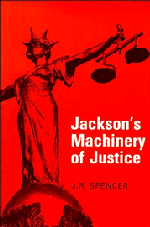Book contents
- Frontmatter
- Contents
- Acknowledgements
- List of figures
- List of tables
- Preface
- Preface to the first edition of ‘The Machinery of Justice in England’
- Abbreviations
- I Historical introduction
- II Civil jurisdiction
- III Tribunals
- IV Criminal jurisdiction
- 19 Courts with original criminal jurisdiction
- 20 Coroners' Courts
- 21 Courts with appellate criminal jurisdiction
- 22 The process of prosecution
- 23 Criminal procedure
- 24 The process of sentencing (including probation)
- 25 Juvenile courts
- 26 The matrimonial jurisdiction of magistrates – the Domestic Court
- V The personnel of the law
- VI The European dimension
- VII The cost of the law
- VIII Law Reform
- Appendix A The Report of the Civil Justice Review
- Table of Cases cited
- Table of Statutes cited
- Table of Stationery Office publications cited
- Index
25 - Juvenile courts
Published online by Cambridge University Press: 10 January 2011
- Frontmatter
- Contents
- Acknowledgements
- List of figures
- List of tables
- Preface
- Preface to the first edition of ‘The Machinery of Justice in England’
- Abbreviations
- I Historical introduction
- II Civil jurisdiction
- III Tribunals
- IV Criminal jurisdiction
- 19 Courts with original criminal jurisdiction
- 20 Coroners' Courts
- 21 Courts with appellate criminal jurisdiction
- 22 The process of prosecution
- 23 Criminal procedure
- 24 The process of sentencing (including probation)
- 25 Juvenile courts
- 26 The matrimonial jurisdiction of magistrates – the Domestic Court
- V The personnel of the law
- VI The European dimension
- VII The cost of the law
- VIII Law Reform
- Appendix A The Report of the Civil Justice Review
- Table of Cases cited
- Table of Statutes cited
- Table of Stationery Office publications cited
- Index
Summary
Traditionally the minimum age for criminal responsibility in England was 7. It was raised by statute to 8 in 1933. and in 1963 it was further raised to 10, where it remains today. A child over the age of 10 can incur criminal liability, but only where he can be shown to have ‘mischievous discretion’ – that is to say, where he knew not only what he was doing but also that it was morally wrong. A person who has become 14 and is under the age of 17 is defined by statute as a ‘young person’. A young person is not protected by the requirement of ‘mischievous discretion’, but like a child, he must usually be tried before a special court called the juvenile court. In the juvenile court virtually all offences are treated as summary offences. There is no right for the child to elect trial on indictment. The only cases which must be sent for trial are homicide, certain grave offences for which there can be detention under direction of the Home Secretary, and cases where a child is charged together with an adult.
Until the middle of the last century there was no special provision for the trial of children; if the offence charged was indictable the trial would be before a jury at Assizes or Quarter Sessions, whilst a petty offence would be tried summarily before justices in the usual way.
- Type
- Chapter
- Information
- Jackson's Machinery of Justice , pp. 305 - 316Publisher: Cambridge University PressPrint publication year: 1989

